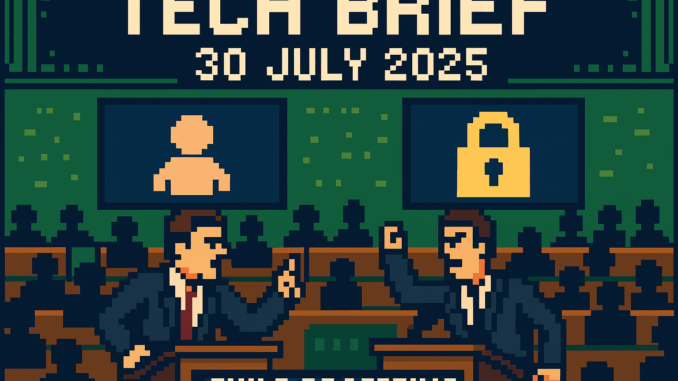
Picture this: a parent glancing over their child’s shoulder as they tap through a new app, a taxi driver checking their mobile for the next fare, a friend debating privacy in a group chat. Tech Brief 30 July 2025 brings today’s headlines right into our living rooms and workplaces. We’re not just reading about policy shifts; we’re living them every time we log on, book a ride, or send a message. Missed yesterday’s Tech Brief? Catch up here before diving in.
Technology Minister Accuses Farage in Online Safety Act Clash
Who gets to decide what’s safe for our kids online? The latest row in Parliament saw Technology Minister Peter Kyle accuse Nigel Farage of siding with “Jimmy Savile” while debating the Online Safety Act. Kyle pushes for strict age checks and tighter controls, while Farage warns these measures could go too far. For anyone who’s ever worried about what their kids see online, or wondered who’s reading their messages, these debates feel all too familiar. Since the days of British home computers and the first bulletin boards, the question of who sets the rules has never been simple. Now, the outcome could change how much privacy and autonomy we all have on UK digital platforms, especially for younger users growing up in an always connected world.
Uber Loses Supreme Court Appeal on UK Taxi VAT
It’s another chapter in the long story of how we hail a ride, whether waving at a black cab or tapping a screen. The UK Supreme Court has ruled that regional taxi operators outside London will not face the 20 percent VAT charge that Uber challenged. This means fares stay lower for many, but it also keeps a line drawn between traditional taxis and app based services. Over the decades, every new transport technology has had to earn its place within existing rules. I still remember reading Micro Mart debates about the first computerised dispatch systems, and now here we are, watching the same arguments play out in the gig economy. This decision keeps choice alive for passengers, but the uneven tax burden will keep the debate rolling about fair competition and the future of gig work.
US Senator Warns of UK Surveillance Risks in Apple Encryption Row
The encryption debate is the digital equivalent of arguing over who holds the keys to your front door, except now the door leads to your entire life’s messages and memories. A US senator has raised new alarms about UK surveillance laws, following a dispute with Apple over demands for encryption ‘back doors’. The UK wants tech companies to give authorities access to encrypted data, but privacy advocates say this weakens security for everyone. It’s a debate that owes much to pioneers like Whitfield Diffie and Martin Hellman, whose work in cryptography set the stage for today’s privacy battles. Since the 1990s Crypto Wars, users and developers have built stronger digital locks, always a step ahead of government demands. The outcome here will shape who controls access to personal data, and how safe digital communication really is.
EU Digital Market Leader Urges UK to Join Data Spaces
Despite Brexit, the UK is being urged to reconnect with European ‘data spaces’ by a leading EU digital market advocate. The call highlights shared goals in digital sovereignty and secure cross border data flows. With the rise of collaborative computing, British and European researchers worked together to set standards for networks and data sharing. Those partnerships enabled innovation and mutual growth, from the earliest packet switched networks to today’s cloud infrastructure. The EU’s plea is both practical and a little nostalgic for when the UK played a central role in European IT projects. The decision will affect everything from cloud services to research collaboration, shaping the UK’s place in the wider digital world.
From the Wayback Machine
On This Day: 1889 – Vladimir Zworykin, pioneer of electronic television, was born. Zworykin’s iconoscope camera tube and kinescope display tube transformed television from mechanical experiments into a practical mass medium. Working at RCA, he built on earlier inventions and international collaborations to deliver sharper images and wider broadcasts. With these tubes, television’s evolution accelerated, paving the way for the CRT screens that became fixtures in British homes. Zworykin’s legacy still lives on in today’s digital imaging sensors, showing how early breakthroughs can shape the way we see the world.
What This Means
Tech Brief 30 July 2025 reminds us that every digital debate, from online safety to data sovereignty, is personal and political. The choices made today build on decades of negotiation and invention. Let’s stay alert to how our tech, rules, and communities are shaped by both history and hope.
Stay curious, keep your soldering iron handy, and never forget that a little tinkering can change everything.
Missed yesterday’s Tech Brief? Catch up here.

Leave a Reply